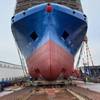Shipping has an important to play in the broader issues affecting global society, IMO Secretary-General Mr. Efthimios E. Mitropoulos told delegates at the opening of the 24th session of the Assembly of the International Maritime Organization at its London Headquarters on Monday 21 November.
Referring to three concerns in particular: wealth imbalance, security and the state of the planet from an environmental perspective, Mr. Mitropoulos said: “I strongly believe that their inherent problems are ones to which we, as the regulators of and, indeed, as members of the international maritime community, can play an active role in finding the solutions – or, at the very least, in making a valuable and beneficial contribution.”
Mr. Mitropoulos pledged IMO’s contribution to meeting the Millennium Development Goals, which have been agreed by the nations of the world through the United Nations. “Here, in IMO, we are determined to play our part and, with the Council deciding last week that the World Maritime Day theme for next year should be ‘Technical Co-operation: IMO’s response to the 2005 World Summit’, with special emphasis on the maritime needs of Africa, we will do all we can to make a difference,” Mr. Mitropoulos said.
While the technical, detailed work of IMO is hugely important, Mr. Mitropoulos said that the Assembly provided an appropriate occasion to view IMO’s work, and the contribution of shipping as a whole, in the context of the broader issues affecting the world.
“The alleviation of poverty is not only a goal in itself but also a catalyst from which so much else, in terms of health, education and equality of opportunity, can flow. Maritime activity has a key role to play in achieving this objective. It already provides an important source of invisible income to many developing countries. Indeed, developing countries now lead the world in some of shipping’s most important ancillary businesses, including the registration of ships, the supply of sea-going manpower and ship recycling. They also play a significant part in shipowning and operating; shipbuilding, - repairing and - recycling; and port services, among others,” Mr. Mitropoulos said.
Seen in a wider context, shipping has an even more important role to play in underpinning the global economy on which all prosperity is based, Mr. Mitropoulos added. “Sea transport remains by far the most cost-effective way to move goods and raw materials in quantity around the world and, as I have stressed at every opportunity this year, the vast majority of global trade is carried, safely and securely, in ships. Moreover, shipping’s safety record continues to improve. The total number of ship losses in 2004, for example, was the lowest since 1989.”
Mr Mitropoulos highlighted the importance of the Voluntary IMO Member State Audit Scheme, set to be adopted during the Assembly, which will provide an excellent opportunity to improve standards for the greater good of all, providing a key tool in the battle against sub-standard shipping,
“The Audit Scheme will allow Members of the Organization to place their own implementation record under the scrutiny of qualified, independent auditors, with a view to identifying where any gaps or weaknesses might be occurring so that, whatever remedial action might be appropriate, can be decided upon. My vision of the Scheme is of one which, rather than causing embarrassment by exposing weaknesses, will instead bring us closer together - helping each other in pursuit of our common goals.” Mr. Mitropoulos said, commending the Assembly to adopt the resolutions on the Framework and Procedures for the Audit Scheme and on the Code for the implementation of mandatory IMO instruments, which is to serve as the audit standard.
Other important issues on the Assembly agenda, highlighted by Mr. Mitropoulos, include a proposed resolution requesting the IMO Marine Environment Protection Committee (MEPC) to develop, as a priority, a new instrument on ship recycling, with a view to providing legally-binding and globally-applicable ship recycling regulations for the international shipping industry and for recycling facilities.
Another draft resolution addresses the problem of piracy and armed robbery against ships in waters off the coast of Somalia. “The relatively new scourge of international terrorism threatens us all, and we need to find new, collaborative ways in which to address it – as much as we need to address the threat of piracy in regions characterized by political instability. I hope the Assembly will share my concern at the increasing number and audacity of pirate attacks on shipping off the coast of Somalia and will endorse my proposals for action, as the Council did, in principle, last week,” Mr. Mitropoulos said. Among his proposals is a request for the Assembly to authorize him to transmit a copy of the present resolution to the Secretary-General of the United Nations for consideration and any further action he may deem appropriate, including bringing the matter to the attention of the Security Council for consideration and action as appropriate
Dr. Stephen Ladyman, Minister of State for Transport, United Kingdom, welcomed delegates to the Assembly on behalf of the host Government. Ministers from 15 other countries also addressed the Assembly.
The outgoing President of the Assembly, His Excellency Mr. Mel Cappe, High Commissioner for Canada and the incoming President, His Excellency Mr. Zha Peixin, Ambassador Extraordinary and Plenipotentiary of the People’s Republic of China, addressed the Assembly.
The 24th session of the IMO Assembly runs until 2 December 2005.
Election of Officers
The Assembly elected His Excellency Mr. Zha Peixin, Ambassador Extraordinary and Plenipotentiary of the People’s Republic of China to the United Kingdom as President of the Assembly.
The Vice-Presidents elected are:
1st Vice-President: His Excellency Dr. Federico Mirré, Ambassador Extraordinary and
Plenipotentiary of Argentina to the United Kingdom; and
2nd Vice-President: Her Excellency Mrs. Christiane Jeanne-Marie Tabele Omichessan, Minister of Transport and Public Works of Benin.
Featured videos

Inmarsat Enhances Service to Drive Digitalization

Tracking Foreign Vessels Working in the U.S. Jones Act Market

Unlock Onboard Data Efficiencies
Subscribe for
Maritime Reporter E-News
Maritime Reporter E-News is the maritime industry's largest circulation and most authoritative ENews Service, delivered to your Email five times per week









